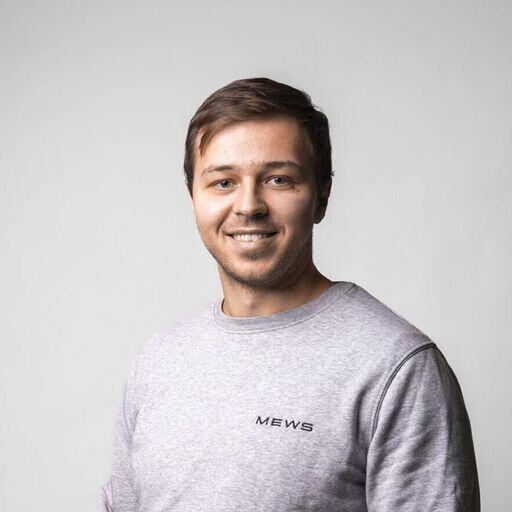Technology has become a huge part of our lives. We all know that more and more tech is born every day, but it continues to surprise us – everyone talks about AI today, but we didn't talk about it in the same way, even two years ago.
This not only impacts how we should think about technology, but it raises important questions about how we should define, track and measure what success looks like in hospitality tech. Let’s explore how.
Table of contents
The rapid pace of hospitality tech
It’s not simply a case of there being more technology: it’s that it’s coming our way faster. One way to consider the pace of transformation is to look at the time it takes for a technology to reach one million users.
If you go back to 1997, Netflix needed three and a half years to reach one million users. Fast forward to 2006, and Twitter only needed two years to reach the same milestone. In 2010, Instagram got there in only five months. In 2022, ChatGPT needed just five days.
Five days. That's incredible. Take a step back and reflect on what this means: it means that as new tech appears faster in our daily lives, we must be faster to adapt to that as a society and industry.
And yet, three percent is the average amount of revenues reinvested into technology in hospitality. Just three percent. In this incredibly fast-paced world that's ever changing, we are only paying attention to the factor of three percent.
But this is just the result of a bigger problem.
It's the way we look at technology, the way we evaluate technology, and the way we use technology today. In hospitality, most people think of the biggest tech transformation as migrating from on-premises to cloud.
In the wider industry, this happened ten years ago, yet we still speak about it in hospitality. We need to go beyond this conversation, beyond talking about the cloud and instead to looking at technology as a major business driver and as a solution to our biggest problems.
The changing view of technology
Take a look at this picture.
At first glance, you might just think: okay, this is a normal picture. But it's crystal clear, it has depth of field, the colors are vibrant... It’s a remarkable picture that was taken by the same piece of technology that you have in your pocket, on your desk, or that you’re reading this on right now. And it’s a great example of how our view of technology has shifted in a short space of time.
A few years back, when we looked at phone cameras, we were obsessed about the technical specs. What is the lens and how many are there? How many megapixels does it have? Now, that conversation has completely shifted.
We no longer talk about the number of megapixels on a phone camera. We look at the outcome. We look for better pictures. We ask: can it take a good picture at night? Can it capture a fast-moving object? That's what we obsess about: not what it is, but what it does.
But this shift isn’t uniform across the wider industry. It's unfortunately not yet the default way we think about technology. Instead of asking for better outcomes, we ask for the same thing, but in the cloud.
I encourage you to ask for more. Much more. I encourage you to ask more from technology, more than functionality. It's time we embrace technology as a major business driver, to treat technology partners as strategic allies to your business and not just vendors.
At Mews, we’re committed to this approach. We’re committed to thinking about your business before we do anything else.
Defining success in hospitality tech
In the example of a phone camera, the desired outcome is clear. It's the photo. But what is the equivalent for hospitality tech? How do you know its true outcome and whether it’s really successful?
At Mews, we believe it's the following five criteria: guest experience, guest lifetime value, revenue per square meter, revenue per employee and time spent on tasks. We believe that every serious hospitality business should look at these areas regularly and adapt depending on performance – and the same applies to technology vendors.
Let me guide you through these areas and show you how technology can help accelerate your efforts in these areas.
1. Guest experience
This is what our industry is about, isn't it? Everything we do, at the end of the day, needs to improve the guest experience, or it doesn't matter.
You can measure guest experience in multiple ways. You can look at reviews, you can do surveys – it doesn't matter how you do it. What matters is that you have a means to look at trends and then to learn and adapt.
Technology can help you in two ways. Directly, by putting guest technology right into your guests’ hands – at Mews, one in four check-ins happen through our self-serve options – or indirectly, by technology giving time back to staff so that they can spend more time with your guests.
2. Guest lifetime value
While delivering remarkable guest experiences, you must also ensure that you operate a sustainable business. That's where guest lifetime value comes in.
Think about this as the other side of the guest experience coin. Is your guest experience so good that they are willing to spend more on it and make repeat visits? That's the ultimate confirmation that your stays are not only remarkable but also make for a sustainable business.
Technology can also help you here on multiple fronts. You can run loyalty programs and marketing campaigns to attract your guests to return, but also to increase the spend of a guest within a single stay.
We see that if given an opportunity, one in ten guests enhances their stay with an upgrade or upsell, even before they check in. This increases the value of their booking before they set foot on the property.
3. Revenue per available square meter (RevPAM)
One way to boost revenue and enhance guest experiences is to offer something that goes beyond the room. Revenue per available square meter (RevPAM) is the ultimate measure of how well you can utilize your whole property and not just your rooms. Think outside of just those eight hours of sleeping and capture the full day of your guests.
Mews-powered properties are making big gains by selling parking lots and meeting rooms. We even have hotels that have snow mobiles and karaoke rooms managed on our platform, and we’re very happy to see so many hoteliers unlocking the benefits of hotel space management with Mews Spaces, including an average total revenue boost of 6%.
By the way, this makes Mews the only property management system to actually manage your property. Everything else is just a room management system.
4. Revenue per employee
Let's consider the most valuable resource of your business: your employees.
Without a happy and productive staff, nothing that we talked about will happen. It's like in an airplane safety demonstration when they tell you to put your mask on yourself first before helping anyone else. If your employees are having a bad experience, they won’t have the time and headspace to provide remarkable guest experiences, and your business won't operate efficiently.
Mews champions the idea of user disengagement. That hotel staff should actually spend less time actively using our platform. That’s more time to spend with guests, which means better guest experiences and a higher likelihood of increasing their lifetime value.
5. Time spent on tasks
Time spent on recurring tasks is a good way to measure productivity. In a hotel, a lot of the day is spent doing the same things over and over: check-out, check-in, printing a bill, taking a payment.
At Mews, we obsess about how long these tasks take, because every minute that you save is a minute that you can reinvest into your business or your guests. We’re always aiming to optimize time; what took a minute yesterday needs to take thirty seconds today and only fifteen seconds tomorrow.
I'm proud to report that the most frequent tasks in Mews take seconds, not minutes, and all the improvements we implemented over the past year resulted in a huge 46% time saving. That’s almost half a hotelier’s time given back.
I hope some of this resonated with you and inspired you to rethink how you define success. I originally presented a version of this article at Mews Unfold 2024 – you can find it, along with plenty more amazing panels and presentations, at the Unfold Unpacked hub.

Author
Pepa Starýchfojtů
Pepa's origin story is an inspiring one: he joined Mews as a humble backend developer and with nothing but hard work and prodigious talent, worked his way through the ranks to lead our tech team.

Essential hotel technology for general managers
Download now
Hospitality hot takes straight to your inbox


.webp)